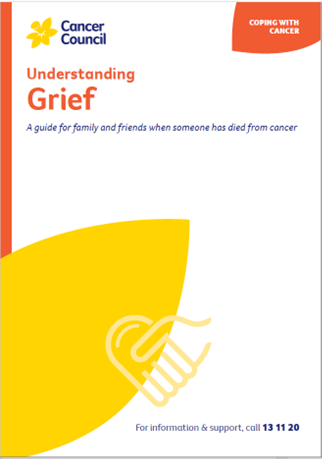- Home
- About Cancer
- Advanced cancer
- Understanding grief
- Common questions about grief
- Why do some things make the grief worse?
Why do some things make the grief worse?
A trigger can be anything that causes a strong reminder of your loss. Many people say the first year or two can be particularly difficult. With time, most people find they learn to adapt, although birthdays, anniversaries or other special dates might always cause a range of strong emotions. Reach out to supportive friends and family at these times.
You may continue to feel a deep sense of loss for the experiences that the person didn’t get to have and that you didn’t get to share. Some people find comfort in visiting the burial site or another significant location, or in gathering with others in remembrance of a family member or friend.
Other losses could trigger your grief again. This may happen when someone else you know dies or when a pet dies, when a relationship ends, or when you lose a job or special possessions. Events that would normally be joyful (e.g. birth of a baby or a wedding) may have a similar impact as you mourn the absence of someone who should have been there to celebrate. Sometimes you may forget that the person has died, and when you suddenly remember, you may be shocked all over again.
You might find there is a time of day when you miss the person most. Or it may be a song, a smell or a place that reminds you of them, and you may feel upset again.
The How you might feel section includes ideas on how to help yourself through these times.
If the person who has died had a digital presence, this is likely to remain for people to see and interact with. You might find encountering them online upsetting or it might be a way to stay connected to the person who has died and a way to “keep them alive”. If you have been nominated as a legacy contact, you can memorialise their Facebook page.
→ READ MORE: Why do I feel so up and down?
Podcast: Coping with Grief
Listen to more episodes from our podcast for people affected by cancer
More resources
A/Prof Lisa Beatty, Associate Professor in Clinical Psychology and Consulting Clinical Psychologist, Flinders University Institute of Mental Health and Wellbeing, SA; Sandra Anderson, Consumer; Dr Alexandra Clinch, Palliative Medicine Specialist and Deputy Director, Palliative Care, Peter MacCallum Cancer Centre and Royal Melbourne Hospital, VIC; Christopher Hall, Chief Executive Officer, Grief Australia; Nathan MacArthur, Specialist Grief Counsellor and Accredited Mental Health Social Worker, Sydney Grief Counselling Services, NSW; Linda Magann, Clinical Nurse Consultant – Palliative Care, St George Hospital, NSW; Palliative Care Australia; Richard Upton, Consumer; Lesley Woods, 13 11 20 Consultant, Cancer Council WA.
View the Cancer Council NSW editorial policy.
View all publications or call 13 11 20 for free printed copies.
Need to talk?
Support services
Caring for someone with cancer
Speak to a health professional or to someone who has been there, or find a support group or forum
Cancer Council Online Community
A community forum – a safe place to share stories, get tips and connect with people who understand
Cancer information
Emotions and cancer
People who are affected by cancer in some way can experience a range of emotions, that can be very challenging to deal with at times. Learn more.
End of life
This information may help you better cope with end of life, or support someone who may be dying with cancer

